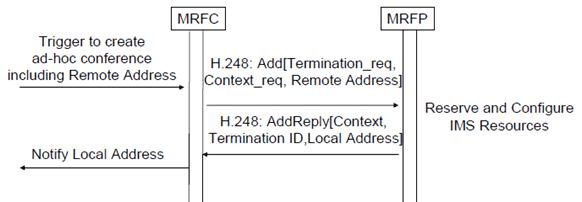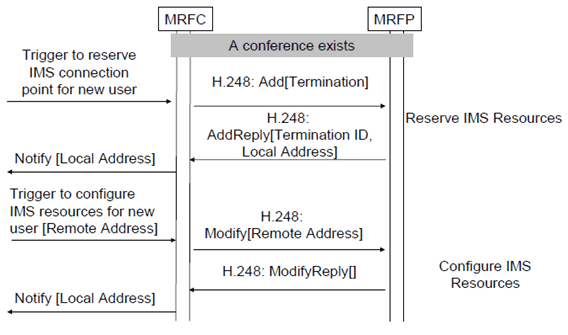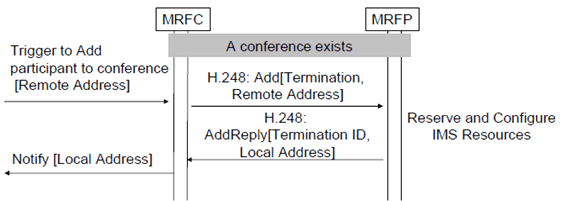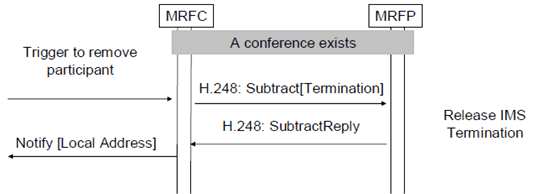Content for TS 23.333 Word version: 17.1.0
1…
4
5…
5.8…
5.12…
5.14…
5.20…
5.24…
6…
6.1.8…
6.2…
6.2.3…
6.2.4…
6.2.5
6.2.6…
6.2.7…
6.2.8…
6.2.9…
6.2.10…
6.2.10.2.7
6.2.10.3…
6.2.11…
6.2.13…
6.2.13.2.6…
6.2.14…
6.2.15…
6.2.16…
6.2.18…
6.2.19…
6.2.19.3…
6.2.20…
6.2.21…
6.2.22…
6.2.23
6.2.24…
7
8…
8.11…
8.20
8.21
8.22
8.23…
8.30…
8.39…
8.45…
8.56…
6.2.10 Multimedia Conference Procedures
6.2.10.1 Context Model
6.2.10.2 Ad-hoc Conferences
6.2.10.2.1 General
6.2.10.2.2 Create Ad-hoc Multimedia Conference Procedure
6.2.10.2.3 Closure of Multimedia Conference Procedure
6.2.10.2.4 Add Subsequent User to Conference; Dial-out
6.2.10.2.5 Add subsequent user to conference; Dial-in
6.2.10.2.6 Remove Conference Participant Procedure
...
...
6.2.10 Multimedia Conference Procedures p. 91
6.2.10.1 Context Model p. 91
A conference consists of one context with terminations representing connections to the participants. Each termination shall support up to three streams, one for audio, one for messaging and one for video. The MRFP shall consider the context to represent an ad-hoc conference when three or more terminations have been through-connected.
It is possible for a user supporting only one media, represented by one stream, to join a conference. The user will then only participate in the part of the conference that is using the supported stream.
6.2.10.2 Ad-hoc Conferences p. 91
6.2.10.2.1 General p. 91
An ad-hoc conference starts without any prior booking or reservation when a user initiates the conference, for further definition of ad-hoc conference, see TS 24.147. Further participants can then be added to the conference without any prior reservation of resources, through either a method of "dial-out" where the conference calls the participant, or by a "dial-in" scenario where the end user calls the conference.
6.2.10.2.2 Create Ad-hoc Multimedia Conference Procedure p. 91
The MRFC receives a trigger to create an ad-hoc conference. The MRFC then initiates the "Reserve and Configure IMS Resources" procedure as specified in clause 8.20, where the connection address and resources shall have multiple values for speech, messaging and video.
The MRFC:
Requests a new context and a new bearer termination including the Remote Connection Addresses.
The MRFP:
Creates a new context
Adds a new termination to the context and returns the Local Connection Address.
The MRFC:
Notifies the new user about the Local Connection Address.
Figure 6.2.10.1 shows the message sequence chart example for creating multimedia conference procedure.

6.2.10.2.3 Closure of Multimedia Conference Procedure p. 92
The MRFP will in accordance with the general rules of H.248.1 delete the context when the last termination has been subtracted from the context.
6.2.10.2.4 Add Subsequent User to Conference; Dial-out p. 92
Precondition for this procedure is that a conference exists. The MRFC receives a trigger to add a new bearer termination. The trigger does not contain connection address nor resources that the new participant can use. The MRFC adds a new bearer termination by initiating the "Reserve IMS Resources" procedure as specified in clause 8.21 where the connection address and resources may have multiple values for speech, messaging and video.
The MRFC:
Requests a bearer termination to be added to the existing context.
The MRFP:
Adds a bearer termination to the existing context and notifies the MRFC about its reserved resources and connection address.
The MRFC:
Sends a notification to the new user about the MRFP's resources and connection address.
The MRFC will then receive a trigger containing the new user's address and resources. The MRFC initiates the "Configure IMS resources" procedure as specified in clause 8.22 where the connection address and resources may have multiple values for speech, messaging and video.
The MRFC:
Requests that remote address and resources be configured to the termination
The MRFP:
Modifies the termination using the received data and confirms the action
The MRFC:
Notifies the new participant about the result
Figure 6.2.10.2 shows the message sequence chart example for dial-out procedure of multimedia conference.

6.2.10.2.5 Add subsequent user to conference; Dial-in p. 93
Precondition is that a conference exists. The MRFC receives a trigger to add a new user including Remote Connection Address. The MRFC then initiates the "Reserve and Configure IMS Resources" procedure as specified in clause 8.20 where the connection address and resources may have multiple values for speech, messaging and video.
The MRFC:
Requests a new bearer termination, including the Remote Connection Address, to be added to the existing context.
The MRFP:
Adds a new termination to the existing context and returns the Local Connection Address.
The MRFC notifies the new user about the Local Connection Address.
Figure 6.2.10.3 shows the message sequence chart example for dial-in procedure of multimedia conference.

6.2.10.2.6 Remove Conference Participant Procedure p. 94
When the MRFC receives a trigger that a user has left the conference, it initiates the "Release IMS termination" procedure as specified in clause 8.23.
The MRFC:
Requests that the termination is released.
The MRFP:
Releases the termination and informs the MRFC about the result.
Figure 6.2.10.4 shows the message sequence chart example for removing multimedia conference participant procedure.
